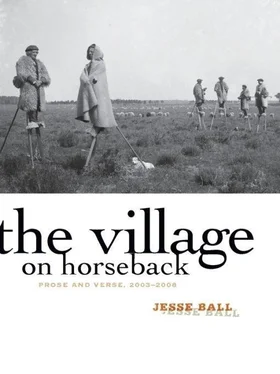Jesse Ball - The Village on Horseback - Prose and Verse, 2003-2008
Здесь есть возможность читать онлайн «Jesse Ball - The Village on Horseback - Prose and Verse, 2003-2008» весь текст электронной книги совершенно бесплатно (целиком полную версию без сокращений). В некоторых случаях можно слушать аудио, скачать через торрент в формате fb2 и присутствует краткое содержание. Год выпуска: 2011, Издательство: Milkweed Editions, Жанр: Современная проза, Поэзия, на английском языке. Описание произведения, (предисловие) а так же отзывы посетителей доступны на портале библиотеки ЛибКат.
- Название:The Village on Horseback: Prose and Verse, 2003-2008
- Автор:
- Издательство:Milkweed Editions
- Жанр:
- Год:2011
- ISBN:нет данных
- Рейтинг книги:5 / 5. Голосов: 1
-
Избранное:Добавить в избранное
- Отзывы:
-
Ваша оценка:
- 100
- 1
- 2
- 3
- 4
- 5
The Village on Horseback: Prose and Verse, 2003-2008: краткое содержание, описание и аннотация
Предлагаем к чтению аннотацию, описание, краткое содержание или предисловие (зависит от того, что написал сам автор книги «The Village on Horseback: Prose and Verse, 2003-2008»). Если вы не нашли необходимую информацию о книге — напишите в комментариях, мы постараемся отыскать её.
Samedi the Deafness
The Way Through Doors,
New Yorker’s
The Village on Horseback
The Village on Horseback: Prose and Verse, 2003-2008 — читать онлайн бесплатно полную книгу (весь текст) целиком
Ниже представлен текст книги, разбитый по страницам. Система сохранения места последней прочитанной страницы, позволяет с удобством читать онлайн бесплатно книгу «The Village on Horseback: Prose and Verse, 2003-2008», без необходимости каждый раз заново искать на чём Вы остановились. Поставьте закладку, и сможете в любой момент перейти на страницу, на которой закончили чтение.
Интервал:
Закладка:
100th verse
For though I think that what we are
we are not long or sour: grosvenor,
selah, or a game of chance; it is
soon said: lay me at your feet as if
to bid the world with its own name.
What name could that be? Who,
tearer of the dog sinew that contracts
vowels, could force a stated name
as mantle to the world? Enforce a name?
It would be easier to bear a prophet
from between pale legs. There are not
many prophets, nor many right names.
And in the air a sky is forming.
A Scolding
And so you see, my little jars of marmalade, there’s trouble enough in the district,
and trouble enough in your heads without you going rambling about the shantytown,
nickels clattering, on your way to gamble with that pie- bald rascal, old Head-of-a-Mule!
Verse
Do I subscribe to that living which may be had
from faith in events? One may
persuade the ground to house vegetables,
pages to house unforgivable solutions. Really,
there are none, only names and this listening.
Hours conclude what birth begins,
not death but sympathy. Men agree
on seven things only, and six will go
undiscovered. We know vaguely
what the earth is, ourselves shapeless in a fog.
The secret signal of the greatest landed
invasion was a verse by Verlaine. Now
I sit, wondering what movements
of men may take my words to herald
deeds to which they’re sent.
One may sit alone, housing hours in a cupboard
with which only this may be done,
to suppose that one may smile, and in smiling
find a damning fact — things may seem true.
Then, the sound of a key in the door—
people enter the room,
your name unspoken in the air about
their heads. What can you say
to such people? Not you, not you—
only life can force them away.
The Distressing Effect of Rumors
I reached into the jar, and sought out their little heads with the palm of my hand.
I could hear them talking and scuffling about.
One said:
Because of the present circumstances, we will soon be forced to sell our children.
To that another replied:
But what of we who have no children?
Missive In a Room in Pau
— What can you do to be of use? asked the Inspector.
— I can make a noise like a bee and I can run fast around corners, said Jana politely.
Balloon Diary, week of the pastoral revolt:
Miles of hedge, farms, fields. Beneath my hand, the tiller is like the soft neck of a soft necked girl when girls come to you for the first time, not knowing who or what they are. You tell them, and they rise like the pasture lands as we float and flourish. I feel sometimes that I am like a god-cloud, harboring useless intents that cannot possibly apply to the things upon the ground. Yet sometimes we descend, Balloon and I, to sample the wares in a market, or touch the aged faces of the orphanages on southward tending prairies. As we passed in evening above an esplanade on which satin girls cavorted, touching hands and lips to satin boys, a man came whistling along and hid in a barrel, hid his body first and then his face. Oh my I said, I wonder. . and wondering, I paused the balloon as you, my friend, might pause your finger above an item in the evening paper. Another came soon along the narrow cliff-walk, a bright-eyed lad in a fresh suit, with a tiny bottle of medicine balanced upon his outstretched hand. It was the serum meant to cure his village, afflicted to the east. This fact came later, in the guise of further suffering, when it seemed that all the suffering had been meted out. Or perhaps I lie! Perhaps it never came at all! In any case — a fine looking lad with a glass bottle, a fine looking barrel wherein waits the curiosity of the modern age. Yes, the barrel burst as past the waistcoat walked. The serum was snatched and no explanation given, but for a sliding from shadow to shadow like imagined monkeys that are not real monkeys, but seem so for a moment. The lad grasped at the barrel shards as if some intelligence might be had from them. In the bottom of the barrel he found a deck of cards, all the cards blank, save the seven of clubs. To it he gave a name: Pistol that I Forfeit. And vowing to forget his plague-ridden village, he traveled into the distant lands of Avecture and Intiman where he made a name for himself as a slayer of false doctors.
Of course, I followed the interloper in my balloon for leagues. He was a loper, a real long-walker of the old variety. But faced with a balloonist, well the outcome is obvious; he could not escape. With my long hooked pole I caught him up.
And if the pollywog doesn’t keep her date with the pastrychef, then the silly little waxwork owl won’t hoot and wake the milk-maid and I promise, I really promise, we’ll be visited by hellions in the simpering night.
The Well
A small boy lived with his grandfather in a little house on a large property. On the far back hill of the farthest corner was an old cemetery. The gravestones had been brushed by the wind and rain until they were small white markers without word or direction. The boy loved to go there, for the grass was deep and soft. And in between the gravestones it was always very quiet. And there was a well. The grandfather said it was the deepest well in the world.

When they dropped stones down, there never was a sound, no matter how long they waited. And in a place like that, you can wait a long time. Not even the sun could reach the bottom, not even at noon on a clear day.

The boy began to spend all of his time there, looking down the well. His grandfather began to worry about him. He told the boy that he was no longer allowed to go there. And one day his grandfather locked the cemetery gate with a long iron key.

For a week, the boy stayed away. But it seemed to him that the rest of the property, his grandfather’s house, even the world of the town, was gray and shrunken. He wanted only to lie in the quiet of the cemetery and gaze down the well.

Days passed in the drudgery of dust caught in household sunlight. Finally it was too much for him. He stole into his grandfather’s room and found the long iron key on a hook high up on the wall. He pushed a chair underneath. Climbing onto the chair, he took the key.

Away he went through the tall grass to the high hill and the cemetery gate. He slid the key into the lock; the gate swung open. Beyond it, the path was a clean rut through the green. In the field and by the road the world’s bustling had been loud in his ears. Now in the shade of the cemetery the boy felt soothed. He lay down on a bed of moss and fell into a deep sleep.

In his sleep he dreamed of climbing into the well and dropping through the loose air to land softly on the bottom. A man was there. He seemed familiar. Beside him was a woman. They took the boy in their arms and their warmth was a long warmth. There was a staircase leading downwards. Its stone steps were smooth marble. He took their hands and descended the stair.
Читать дальшеИнтервал:
Закладка:
Похожие книги на «The Village on Horseback: Prose and Verse, 2003-2008»
Представляем Вашему вниманию похожие книги на «The Village on Horseback: Prose and Verse, 2003-2008» списком для выбора. Мы отобрали схожую по названию и смыслу литературу в надежде предоставить читателям больше вариантов отыскать новые, интересные, ещё непрочитанные произведения.
Обсуждение, отзывы о книге «The Village on Horseback: Prose and Verse, 2003-2008» и просто собственные мнения читателей. Оставьте ваши комментарии, напишите, что Вы думаете о произведении, его смысле или главных героях. Укажите что конкретно понравилось, а что нет, и почему Вы так считаете.












